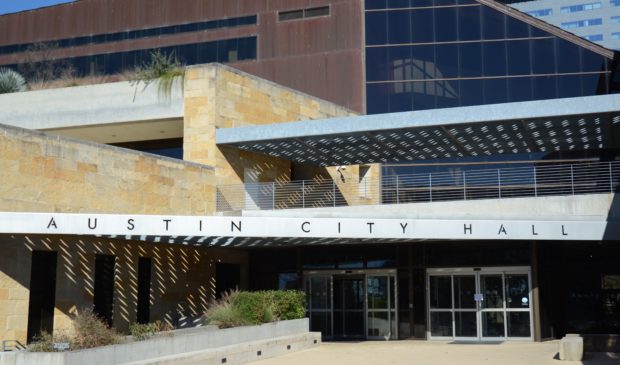Unconventional Austin campaign finance violation moves to final hearing but could still be withdrawn
Friday, November 15, 2019 by
Jessi Devenyns November elections have come and gone, but the Ethics Review Commission is still dealing with the ripple effects caused by a purported violation of campaign finance laws.
Political consultant Mark Littlefield filed a complaint in late October alleging that Unconventional Austin, a political action committee that advocated for Proposition B, broke the law when it failed to report an expenditure on time and on the correct form.
Prop B would have required a public vote on any expansion of the convention center and diverted an increased percentage of the Hotel Occupancy Tax to efforts linked to culture and tourism. It failed to pass, with 55 percent of voters voting against it.
The complaint pointed to the Sept. 12 date of $3,000 in Facebook ads, made by Vici Media for the PAC. On the original filing, the expenditure was labeled an “advertising expense.” City code requires that funds used in direct advocacy for the political agenda of a PAC be reported to the city within two days of the expenditure, if it was made within 60 days of the date of the election.
Attorney Fred Lewis later corrected the filing to reflect that the expense was for a poll rather than an advertisement, which made all the difference, he argued at the Nov. 13 meeting of the Ethics Review Commission.
According to him, a poll does not fall under the purview of a “direct campaign expenditure” as defined by city code. According to that definition, funds must contribute to the “express advocacy” of political agendas or “electioneering communication.” The poll, Lewis told commissioners, was not a push poll but instead a “scientific,” nonpartisan effort to understand people’s stance on Austin election issues in order to better develop the PAC’s messaging.
Furthermore, he said that the Sept. 12 date was the day that the invoice was paid to Vici Media rather than the day the ads appeared on Facebook. The ads were run in late August. “The poll was completed by the first day of September,” he said.
Sept. 1 was 66 days before the Nov. 5 election and outside of the 60-day window that triggers the filing of the expenditure report with the city.
“I believe what Mr. Lewis said – that the ads ran and they were over,” said Littlefield. Although he pressed the commission to move forward to a final hearing in order to have all the evidence on the record and erase any remaining shreds of doubt, Littlefield said, “If everything lays out the way we think it will, I will likely withdraw the complaint.”
On several occasions, Lewis has publicly admitted to making a mistake in labeling the expenditure an ad rather than a poll. At the ethics commission, he said in light of his admission and correction, “The whole (complaint) is really rather frivolous.”
Littlefield pointed out that in the corrected filing there was no sworn affidavit to affirm the accuracy of the document.
Lewis maintained that the complaint by Littlefield was politically motivated. “The pollster just had the most horrible defect and that was that he was a Republican,” Lewis said.
In an earlier press release when the complaint was first filed, Littlefield accused the PAC of not wanting to report the expenditure because one of the principals of Vici Media consulted for Donald Trump’s 2016 presidential campaign and continues to work for Trump’s reelection campaign.
The commission found itself asking for documented proof that the poll did indeed end at the beginning of September as well as evidence of what the Facebook ads looked like, where participants were directed when they clicked the ad, and the content of the web page.
Lewis told the commissioners that he had not seen the ads when they were running on Facebook or afterward.
Before the conversation went too far, Commissioner Pedro Villalobos stopped the commissioners to point out that the purpose of a preliminary hearing was simply to determine whether there were reasonable grounds to proceed to an evidentiary hearing.
The commissioners continued to question the nature of the ads and whether or not they were actually taken down in late August or if the content was as neutral as Lewis claimed. Finally, they voted unanimously to move to a final hearing. Commissioners Nathan Ryan and Betsy Greenberg were absent.
“I think the rules we have are important and should be followed,” Littlefield said.
Lewis, however, was fed up. “When we filled out the form, I made a mistake and I corrected it,” he said. He stormed out of the room before the commissioners were able to vote on whether or not to proceed to a final hearing.
In an email, Lewis told the Austin Monitor, “It is a frivolous complaint and a waste of time, and Littlefield knows it. It is too bad the commissioners don’t understand that.”
Photo by John Flynn.
The Austin Monitor’s work is made possible by donations from the community. Though our reporting covers donors from time to time, we are careful to keep business and editorial efforts separate while maintaining transparency. A complete list of donors is available here, and our code of ethics is explained here.
You're a community leader
And we’re honored you look to us for serious, in-depth news. You know a strong community needs local and dedicated watchdog reporting. We’re here for you and that won’t change. Now will you take the powerful next step and support our nonprofit news organization?









